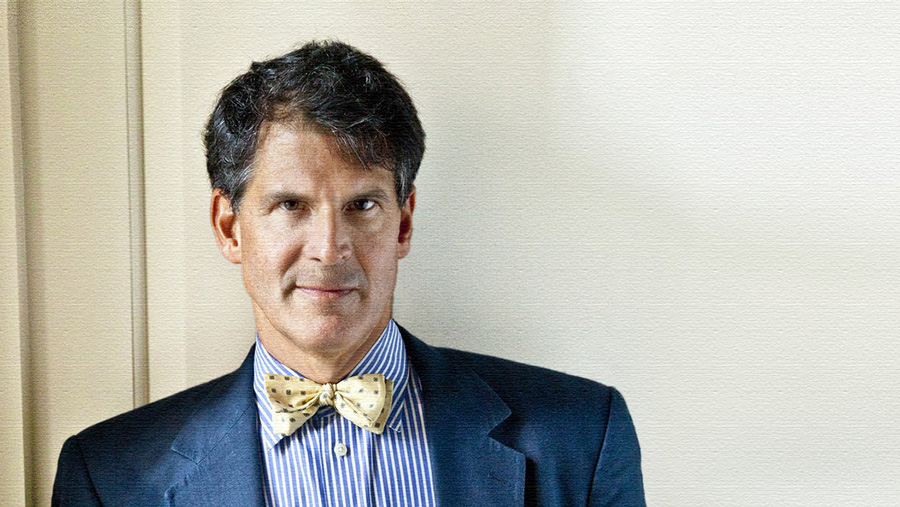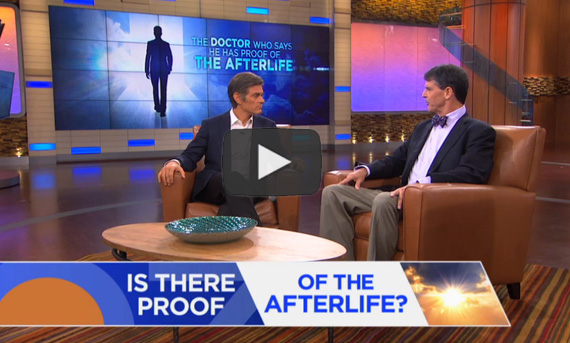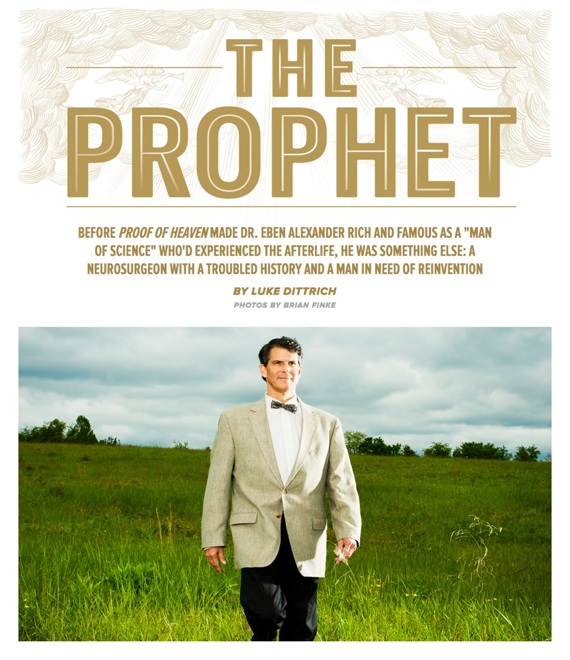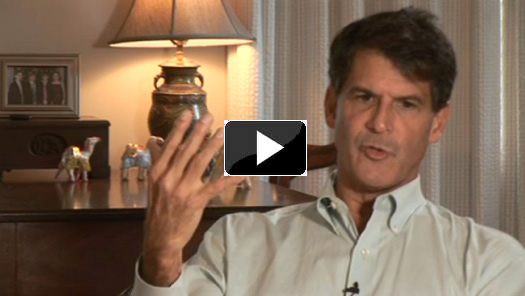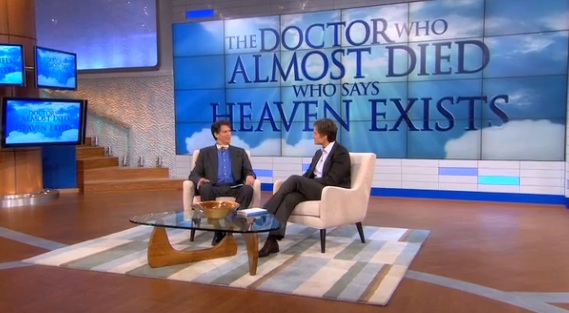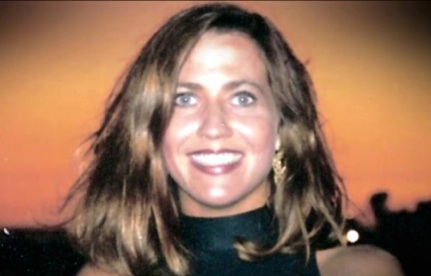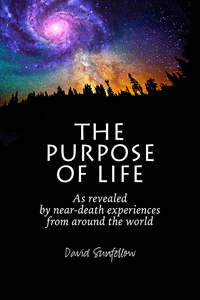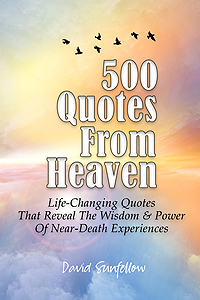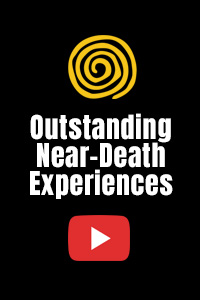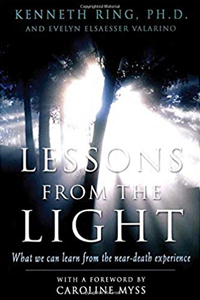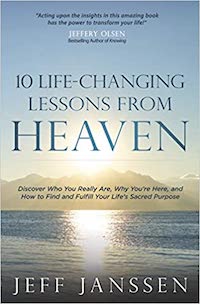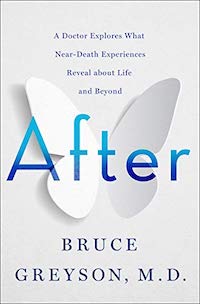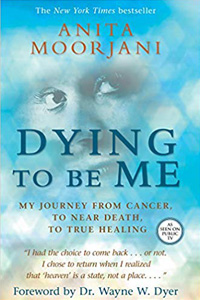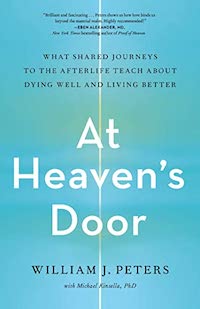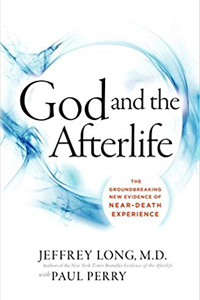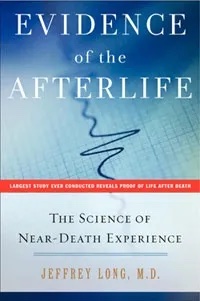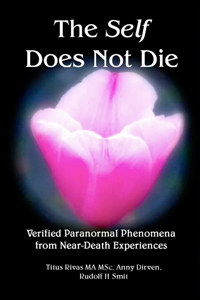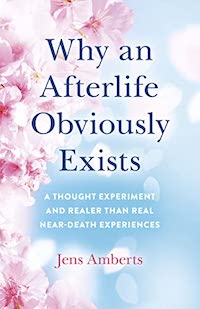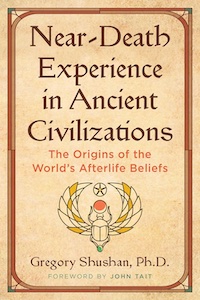Dr. Eben Alexander III has been an academic neurosurgeon for the last 25 years, including 15 years at the Brigham & Women’s Hospital and Harvard Medical School in Boston, Massachusetts. Over those years he personally dealt with hundreds of patients suffering from severe alterations in their level of consciousness. Many of those patients were rendered comatose by trauma, brain tumors, ruptured aneurysms, infections, or stroke. Based on his training as a neurosurgeon, Dr. Alexander “knew” that what people of faith call the “soul” is really a product of brain chemistry. NDEs, he would have been the first to explain, might feel real to the people having them, but in truth they are simply fantasies produced by brains under extreme stress.
In the predawn hours of November 10, 2008, Dr. Alexander himself became a comatose patient. For reasons that remain obscure, he was overcome by a fulminant bacterial meningitis and was comatose on a ventilator in the Intensive Care Unit within hours. His physicians were stunned to find that the culprit was a bacteria that almost never causes spontaneous meningitis in adults. After six days on triple antibiotics, showing no response and with little neurological function remaining, his physicians had few words of encouragement for his family.
For seven days Alexander lay in a hospital bed in a deep coma. Then, as his doctors weighed the possibility of stopping treatment, Alexander’s eyes popped open. Alexander’s recovery is by all accounts a medical miracle. But the real miracle of his story lies elsewhere. While his body lay in coma, Alexander journeyed beyond this world and encountered an angelic being who guided him into the deepest realms of super-physical existence. There he met, and spoke with, the Divine source of the universe itself.
Before Alexander underwent his journey, he could not reconcile his knowledge of neuroscience with any belief in heaven, God, or the soul. That difficulty with belief created an empty space that no professional triumph could erase. Today he is a doctor who believes that true health can be achieved only when we realize that God and the soul are real and that death is not the end of personal existence but only a transition.
…………….
Websites & Background Information
• Dr. Eben Alexander Website
• Inner Sanctum
• Eternea
• Life Beyond Death on Facebook
• Dr. Eben Alexander on Facebook
• Dr. Eben Alexander on Twitter
• NHNE Pulse coverage of Dr. Eben Alexander
• Wikipedia on Eben Alexander III
• Eben Alexander, MD, Curriculum Vitae
• Publications by Dr. Eben Alexander
• Dr. Eben Alexander’s Letter to the Neurological Community
• Background information on Dr. Eben Alexander III, MD (provided by HealthGrades)
• Eben Alexander Videos (includes ability to download)
…………….
Books
Proof of Heaven: A Neurosurgeon’s Near-Death Experience and Journey into the Afterlife (2012)
Amazon Description:
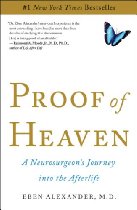 “Thousands of people have had near-death experiences, but scientists have argued that they are impossible. Dr. Eben Alexander was one of those scientists. A highly trained neurosurgeon, Alexander knew that NDEs feel real, but are simply fantasies produced by brains under extreme stress.
“Thousands of people have had near-death experiences, but scientists have argued that they are impossible. Dr. Eben Alexander was one of those scientists. A highly trained neurosurgeon, Alexander knew that NDEs feel real, but are simply fantasies produced by brains under extreme stress.
“Then, Dr. Alexander’s own brain was attacked by a rare illness. The part of the brain that controls thought and emotion — and in essence makes us human — shut down completely. For seven days he lay in a coma. Then, as his doctors considered stopping treatment, Alexander’s eyes popped open. He had come back.
“Alexander’s recovery is a medical miracle. But the real miracle of his story lies elsewhere. While his body lay in coma, Alexander journeyed beyond this world and encountered an angelic being who guided him into the deepest realms of super-physical existence. There he met, and spoke with, the Divine source of the universe itself.
“Alexander’s story is not a fantasy. Before he underwent his journey, he could not reconcile his knowledge of neuroscience with any belief in heaven, God, or the soul. Today Alexander is a doctor who believes that true health can be achieved only when we realize that God and the soul are real and that death is not the end of personal existence but only a transition.
“This story would be remarkable no matter who it happened to. That it happened to Dr. Alexander makes it revolutionary. No scientist or person of faith will be able to ignore it. Reading it will change your life.”
…………….
The Map of Heaven: How Science, Religion, and Ordinary People Are Proving the Afterlife (2014)
Amazon Description:
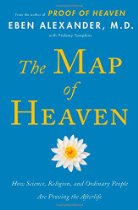 “The author of the #1 New York Times bestseller Proof of Heaven teams up with the sages of times past, modern scientists, and with ordinary people who have had profound spiritual experiences to show the reality of heaven and our true identities as spiritual beings. The Map of Heaven takes the broad view to reveal how modern science is on the verge of the most profound revolution in recorded history — all around the phenomenon of consciousness itself!
“The author of the #1 New York Times bestseller Proof of Heaven teams up with the sages of times past, modern scientists, and with ordinary people who have had profound spiritual experiences to show the reality of heaven and our true identities as spiritual beings. The Map of Heaven takes the broad view to reveal how modern science is on the verge of the most profound revolution in recorded history — all around the phenomenon of consciousness itself!
“When Dr. Eben Alexander told the story of his near-death experience and his vivid journey to the other side, many readers wrote to say it resonated with them profoundly. Thanks to them, Dr. Alexander realized that sharing his story allowed people to rediscover what so many in ancient times knew: there is more to life, and the to the universe, than this single earthly life.
“Dr. Alexander and his co-author Ptolemy Tompkins were surprised to see how often his readers’ visions of the afterlife synced up with each other and with those of the world’s spiritual leaders, as well as its philosophers and scientists. In The Map of Heaven, he shares the stories people have told him and shows how they are echoed both in the world’s faiths and in its latest scientific insights. It turns out there is much agreement, across time and terrain, about the journey of the soul and its survival beyond death.
“In this book, Dr. Alexander makes the case for heaven as a genuine place, showing how we have forgotten, but are now at last remembering, who we really are and what our destiny truly is.”
…………….
Living in a Mindful Universe: A Neurosurgeon’s Journey into the Heart of Consciousness (2017)
Amazon Description:
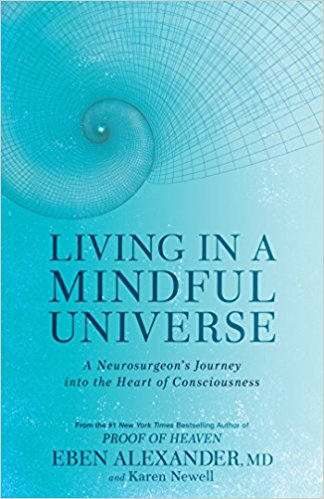 Dr. Eben Alexander, author of international phenomenon Proof of Heaven, shares the next phase of his journey to understand the true nature of consciousness and how to cultivate a state of harmony with the universe and our higher purpose.
Dr. Eben Alexander, author of international phenomenon Proof of Heaven, shares the next phase of his journey to understand the true nature of consciousness and how to cultivate a state of harmony with the universe and our higher purpose.
In 2008, Dr. Eben Alexander’s brain was severely damaged by a devastating case of bacterial meningitis, and he lapsed into a weeklong coma. It was almost certainly a death sentence, but Dr. Alexander miraculously survived―and brought back with him an astounding story. During those seven days in coma, he was plunged into the deepest realms of consciousness, and came to understand profound truths about the universe we inhabit. What he learned changed everything he knew about the brain, mind, and consciousness and drove him to ask a question confounding the entire scientific community: How do you explain the origins of consciousness if it is not a byproduct of the brain. His challenge relates to a revolutionary shift now underway within our modern scientific understanding. Ultimately, direct experience is key to fully understanding how we are all connected through the binding force of unconditional love and its unlimited power to heal.
In Living in a Mindful Universe, the New York Times bestselling author of Proof of Heaven and The Map of Heaven shares his insights into the true nature of consciousness. Embracing his radically new worldview, he began a committed program of personal exploration into non-local consciousness. Along the way, he met Karen Newell, who had spent most of her lifetime living the worldview he had only just discovered was possible. Her personal knowledge came from testing various techniques and theories as part of her daily routine. With Living in a Mindful Universe, they share techniques that can be used to tap into our greater mind, and explore how the power of the heart can enhance healing, relationships, creativity, guidance, and more. Using various modalities related to meditation and mindfulness described herein, you too can gain the power to access that infinite source of knowing so vital to us all.
…………….
Eben Alexander and Karen Newell – Buddha at the Gas Pump Interview
Some points discussed during this conversation:
• Eben’s NDE and improbable recovery, including experience of a subterranean realm, the collapse of 4-dimensional reality, his guardian angel, and a “gateway valley” in which souls reside between lives.
• The importance of music and sound. Binaural beats.
• Experiencing a life review (how we impacted others) during NDEs has been reported for over 2,000 years.
• Dealing with things now so they do not need to be handled during your life review.
• The brain does not create consciousness. Our mental states create our physical reality.
• Is the world about to undergo a “phase transition” to a “golden age”?
• The alignment of science and spirituality – the afterlife and reincarnation studied seriously. Important because mainstream society trusts science. The work of Ian Stevenson and Jim Tucker.
• The brain as a filter.
• The harmful ramifications of science not understanding consciousness as primary.
• Materialists are entrenched because it’s hard to admit that one’s life’s work has been based upon a misunderstanding. They are going extinct.
• Memory storage: in the brain or in the ‘cloud’?
• Kindness, compassion, love, forgiveness – feminine qualities the world needs now.
• The importance of discernment on the spiritual path.
• How would a person choose their parents and other life events? Our perspective between lives is much broader and not ego-bound.
• How do we know our life’s purpose and how to live it?
• During sleep, we interact with subtle realms.
• The veil shrouding humanity’s consciousness is thinning.
• Do we reunite with pets on the other side?
• Illness can be a learning experience for the soul.
…………….
Thinking Allowed: Integrating the Near-Death Experience with Eben Alexander
…………….
Dr. Eben Alexander: Life Changing Lessons From The Author Of Proof Of Heaven
…………….
Eben Alexander: A Neurosurgeon’s Journey through the Afterlife
…………….
Dr. Oz – Is There Proof Of The Afterlife?
…………….
Eben Alexander – Synthesis of Science and Spirituality: The Arc of Human Destiny over Millennia
…………….
Eben Alexander: Consciousness & Sacred Sound
…………….
Touching Heaven
By Manuel Teodoro
MST Lifestyle
April 4, 2015
Eben Alexander, M.D., is the neurosurgeon who fell into a coma while suffering from bacterial meningitis. He claims to have had a transcendental Near-Death Experience (NDE), which allowed him a glimpse of heaven, as well as proof of the existence of God and the afterlife. He insists his experience was not a hallucination, as his brain was comatose and incapable of any activity. He wrote about his NDE in the book Proof of Heaven. His latest book is called The Map of Heaven, which touches on meditation and the path to transcendence. “It’s all about how the answers lie within us all,” he says.
Alexander’s claims — and his own professional and personal history — are not without controversy, but that hasn’t stopped his book from climbing up the bestseller lists worldwide.
MANUEL TEODORO: For the benefit of those in our audience that aren’t completely aware of your story… Run us through, Dr. Alexander, quickly what exactly happened and what the diagnosis was.
EBEN ALEXANDER: Okay. It all came on very suddenly and I developed severe back pain, and headaches, and within 2-3 hours had grand mal seizures, was driven deep into coma and I was taken to the emergency room and at that point they determined that I had gram negative bacterial meningitis, which is really about the worst kind of bacterial meningitis you could have. In fact, I was extremely ill from this; my neocortex – the human part of the brain – the last sign of any kind of function of that neocortex was within an hour or so of hitting that emergency room, and from then on, my neocortex was gone. It’s something I came to realize in the months after my coma, trying to analyse and understand it, is that that kind of meningitis is the perfect model for human death, because meningitis attacks the surface of the brain, the outer surface of the neocortex is the part that makes us human. All of human conscious experience, according to conventional neuroscience, demands that that neocortex, or at least some part of that must be active. Everything we see, everything we hear, all of our emotions, falling in love, appreciating a beautiful symphony or sunset, every bit of that demands that the six-layer neocortex – the human part of the brain – be functioning.
That’s why it was such a gift that I had a really flagrant case of meningitis that by all accounts should have killed me, and certainly should not have allowed for any rich, elaborate, ultra-real experience like I had deep in coma.
MT: Allow me to ask you one really quick question – what were your religious beliefs before and how did heaven play into those beliefs before this happened?
EA: Before this coma, I had grown up in a Methodist church in North Carolina, and my father was very religious. He had come from eastern Tennessee. He was very spiritual, he had grown up in the Baptist church but he was a neurosurgeon, in fact he was an academic neurosurgeon, and he was the chairman of a neurosurgical training program. So he was deeply into science, he was every bit science, but he also had a religious faith. So a lot of that rubbed off on me when I was younger.
I wanted to believe what I’d heard in church. But like so many who had grown up in the 60s and 70s, I knew full well that science is the pathway to truth. And I’ll tell you, I am more of a scientist now than I’ve ever been in my life, and I realize that what is happening now is that science needs to greatly expand its boundaries to fully encompass the fundamental role of consciousness and acknowledge that the soul exists.
MT: So it would be fair to say you were agnostic before?
EA: Yes, for 8 years leading up to coma. And I think that’s important for people to understand. I went into my coma journey open-minded, but certainly not a believer. And my coma journey showed me very clearly that God and that the eternal realm of our eternal spiritual selves are much more real that this. “This” is dreamlike by comparison. And that realm is absolutely, fundamentally rock-solid, that’s our soul home. And that is the most beautiful thing. So in other words when our physical brain and body die, it actually liberates our conscious awareness up to that grander knowing and being, reuniting with our higher soul, reuniting with our soul mates, going through our life review… If we were handing out pain and suffering to others we have to relive that in our life review on behalf of our victims. In our words there is no need for an eternal hell, we have to go through that in a life review and feel it, feel the power of the emotional impact of our decisions and choices in life, the impact on others around us.
MT: What are some of the fundamental – what would you call them, visions? – or aspects of that experience that you had that make you– that when you came back convinced you that you went to heaven?
EA: In fact, for months after I came back, I was not convinced I’d gone to heaven. I knew something very shocking and completely – I mean shattering – had happened, that completely threw all my models of brain-mind consciousness and existence — threw all that out of the window. What had happened weeks after my coma, going back to my medical records, I had gone back to the hospital to talk to my doctors, my neurologists, neurosurgeons I had seen, went through the medical records, went through all my scans, and started realizing, hey wait a minute, this brain was way too sick, the neocortex was far too damaged to come up with anything and so when I first came back I was blown away by the experience, completely. I mean, it’s the most shocking thing you can imagine. But remember that I didn’t know anything. All my knowledge, my brain, my consciousness, had been stripped away during the journey by the meningitis. That’s how I explained it initially, severe bacterial meningitis destroys the neocortex, of course it would get rid of all prior experience and memory. So that part seemed to be no surprise. But the deeper I got into it the more I realized, well, I shouldn’t have had any experience at all! And my doctors were very keen to tell me, when I tried to tell them what had happened, well you can’t have experienced anything, your neocortex was badly damaged, in fact we had no idea how you’d come back. To this day they have no explanation as to why I had a full recovery, and I think that’s an essential thing to understand about this: that I went through a long process, and that’s what Proof of Heaven is all about. It shows how I tried to explain this, as a brain-based mechanism. I tried to explain this as some kind of a dream, a drug-affected confabulation, a trick of the dying brain. That’s what my doctors told me when I came back. And yet the more I went over my medical records and my experiences with my doctors, the more I came to realize that there is no way that this brain, so devastated by bacterial meningitis, could have manufactured any of that. It should have been a state of nothingness, with the near-destruction of my neocortex. And yet it was much more like the blinders coming off and an awakening to a far richer, more vibrant and alive reality than the one in this world. And that was the deep mystery that demanded some kind of explanation.
MT: What is your message, Dr. Alexander, to the inevitable skeptics that maintain to this day that what you had were hallucinations, and that it just wasn’t heaven?
EA: Well I would say that anyone who says that simply doesn’t know enough about gram negative bacterial meningitis. This is why you don’t have a lot of doctors out there coming out and saying, well, we see this now and then, and Dr. Alexander simply had a hallucination. If they know anything about the medical story, anything about gram negative bacterial meningitis, and about someone being driven into coma within 3 hours and spending 7 days in coma with that diagnosis, and know all the details of my medical illness, it was such a severe case there was really no way I could have had any kind of experience based on my neocortex and so that’s why the scientific world takes this story very seriously. So there’ll be plenty of skeptics – I would call them pseudo-skeptics, debunkers, deniers who simply won’t believe it no matter what. People who are addicted to scientific materialism as if it were the brain creating consciousness, and there are many people out there. I mean, I was exactly like that before my coma so I know exactly what that thinking is all about. But any pseudo-skeptic who puts it out there that this had to be a hallucination simply has not paid enough attention to the medical details of this case.
MT: Can you describe a little bit of that coming back? What that phase was like?
EA: Well the coming back was like… It was the hardest thing I can ever remember in all my existence. It was like climbing out of a gravel dirt pit where every move is just pulling and everything around you was – it was impossible to climb out of there and back into this world. And yet I knew I had to be strong, the sense of responsibility and love for that soul, for my 10-year-old son who again, I did not remember at the time, that I had to come back. So it was a tremendous struggle coming back to this world, it was all for the love for him that I had to. And when I first started waking up in that ICU, and was fighting the ventilator – they were pulling – they had finally pulled the tube out and all that – I remembered nothing of my life before. As I said before I remembered deeply everything I had been through in this coma journey and there were family members standing around and I had no idea who they were.
MT: Do you as we speak believe that when you die, you will go to heaven?
EA: All I know is that when I die, I will reunite with my higher soul to a much greater awareness. That’s probably the biggest shock for the skeptic when they die, is all of a sudden they come to this realization that not only are they still here, but they are far more aware than they ever were when they were incarnate in this physical form, and they they’ll reunite with their entire soul, soul mate, go through this life review and encounter than infinitely powerful deity that is pure love, to go back into that oneness of the core. And than plan that reincarnation to come back with the soul group to do it again and get it better. This is all about the essence of our soul group. And in fact all of humanity and beyond is part of this ascendance, this evolution of consciousness that is occurring. But each one of us is doing it on our own as part of that far grander evolution of consciousness. And that is something that will happen.
…………….
The Prophet
By Luke Dittrich
Esquire
July 3, 2013
Esquire has published a critical article about Dr. Eben Alexander, his near-death experience, and best-selling book, “Proof of Heaven.” Among other things, the article describes a series of malpractice lawsuits from Dr. Alexander’s past (including one where he falsified medical records), and a long string of apparent inconsistencies in Alexander’s story. To read Esquire’s article, click here. To read a comprehensive summary of Esquire’s article that includes additional background information, videos, reader comments, and preliminary take-aways, go here.
In response to the Esquire article, Dr. Eben Alexander issued the following statement through a Simon & Schuster spokesman:
“I wrote a truthful account of my experiences in PROOF OF HEAVEN and have acknowledged in the book both my professional and personal accomplishments and my setbacks. I stand by every word in this book and have made its message the purpose of my life. Esquire’s cynical article distorts the facts of my 25-year career as a neurosurgeon and is a textbook example of how unsupported assertions and cherry-picked information can be assembled at the expense of the truth.”
…………….
NDE Researcher Robert Mays Examines The Facts
NDE Researcher Robert Mays examines some of the facts surrounding the article that Luke Dittrich wrote for Esquire about Dr. Eben Alexander.
To read the complete article, click here or here (pdf).
EXCERPTS:
…if Dittrich had interviewed Phyllis, she would have told him:she and her mother saw a rainbow as they were entering the hospital about 1 PM. It was to the right of the entrance (north of the hospital) where there are mountains. They commented on the rainbow and Betty noted, “It’s a perfect rainbow!” When they turned the corner into Eben’s ICU room a few moments later, Eben was sitting up in bed.
Later that day, Phyllis emailed friends back in Boston, telling them about Eben’s miraculous recovery — and about the rainbow she and her mother had witnessed. She offered to show me the email.
…
…if Dittrich had asked her, Holley would have confirmed the story: indeed, at some time in the ER Eben had shouted out “God, help me!” and everyone present including Holley and Michael Sullivan had rushed to his side — Holley had been just outside the curtain — but Alexander fell back unresponsive. Those present were given hope that he was recovering, but those hopes faded quickly.
I spoke with Holley Alexander recently. She said that this incident occurred about an hour or so after she had arrived in the ER with Eben. “It happened before they sedated him, while the doctors were trying to get vital signs and spinal fluid and all that. I said to Michael [Sullivan], ‘He spoke!’ and Eben kept writhing. Dr. Potter might not have heard it. She was in and out, checking scans, spinal fluid, so it’s very likely that she wasn’t there.
And yes, this happened before Alexander was intubated, so Eben Alexander’s only embellishment was to fudge the timing of the incident, for dramatic effect — a trivial adjustment.
…
Dittrich did not recheck with Dr. Potter and did not show her how he was quoting her. Had he done so, he would have gotten a surprise.
Sylvia White reported that Dr. Laura Potter became concerned after she was contacted by the press when the Esquire article first appeared, and subsequently expressed her alarm about the way her remarks were being twisted. Dr. Potter made the following statement in an email:
“I am saddened by and gravely disappointed by the article recently published in Esquire. The content attributed to me is both out of context and does not accurately portray the events around Dr. Eben Alexander’s hospitalization. I felt my side of the story was misrepresented by the reporter. I believe Dr. Alexander has made every attempt to be factual in his accounting of events.” — Dr. Laura Potter
So Luke Dittrich’s portrayal of the events regarding Alexander’s illness is inaccurate. Dittrich took Dr. Potter’s statements out of context, twisted them and misrepresented them.
…
Now we see that all three key flaws in Eben Alexander’s story have turned out to be totally false or trivial. And Luke Dittrich is relying especially on this last one to build a case that Alexander’s story is a complete fabrication, and his heavenly experience a hallucination or a fantasy.
All it would have taken was a simple conversation with two or three of the people identified in Proof of Heaven as witnesses — who were available to be interviewed — to corroborate or definitively refute Alexander’s account. In this last case, Dittrich’s argument rested solely on the assessment of Dr. Laura Potter. Yet had he asked her, Dr. Potter would have confirmed the accuracy of Alexander’s story. Likewise Holley, Michael Sullivan, Phyllis Alexander and Sylvia White would have confirmed the accuracy of the story in Proof of Heaven.
…
To Esquire’s Editor in Chief David Granger, Luke Dittrich’s story is great journalism. To me the Dittrich article is shoddy and irresponsible journalism — shoddy because of Luke Dittrich’s and his Esquire editors’ evident failures: failure to consider alternate explanations (rainbow), failure to check with the cited witnesses (Phyllis and Betty Alexander), failure to verify information with additional witnesses (Holley Alexander, Michael Sullivan and others), failure to check with medical experts (on the likely cause of coma), failure to check again on crucial testimony of the sole cited witness (Laura Potter), failure to read the book carefully (Dr. Wade’s statement about Alexander’s coma), failure to verify conclusions via other witnesses (Holley Alexander and Sylvia White), failure to exercise care in asserting erroneous facts (use of drugs was not mentioned in the book), failure to exercise care in quoting and interpreting recorded remarks (Dalai Lama), and failure to exercise common sense in interpreting the meaning of statements (Dalai Lama).
…………….
Concerning The Esquire Article About Eben Alexander III, M.D.
By P.M.H. Atwater
“The book Proof of Heaven honestly and effectively portrays the near-death experience of Eben Alexander III, M.D. His case has been mentioned several times in this newsletter. I was one of the near-death researchers he turned to, and I have interviewed him at length. I can personally verify that what happened to him, although unique in its medical components, was typical of such experiences — what it consisted of and how he responded to it – including the pattern of aftereffects which he now displays. I have no hesitation, then or now, in presenting Dr. Alexander as an honest, loving, and caring individual, who has done his best to share the elements of his close brush with death, how medically “at the edge” he was, the near-death episode that filled and expanded his world, his recovery, and the reason he feels he survived. . . to share the message of an afterlife with others around the world. His sense of mission is strong. Like so many of us, though, he crossed paths with a staff writer for a magazine who misquoted him and failed to thoroughly check out what appeared to be facts. The result was a magazine article printed in Esquire Magazine that defamed him in ways that have been difficult at first to counter. Clearly, there seems to be a case of fraud here, or at least of an author who did not do all the fact-checking that could and should have been done. If you are interested in the truth in this matter and how the Esquire author “goofed,” please access this link for a complete and accurate accounting of the real facts.”
…………….
Lilou Mace Interviews Dr. Eben Alexander
…………….
Dr. Raymond Moody Interviews Dr. Eben Alexander
In this two-hour video, Dr. Eben Alexander describes his near-death experience to Dr. Raymond Moody, the father of the near-death experience movement. Then the two doctors spend time discussing near-death experiences in general, including such topics as the hard question of consciousness, how the soul and consciousness exist independent of the brain, quantum physics, the true nature of time, space, and reality, reincarnation, evil and injustice, the purpose of life, the purpose of challenges and difficulties in our lives, the importance of love, relationships, and learning, the importance of “doing the work” (not just reading books and attending conferences), the world being on the verge of a global awakening, the merging of science and spirituality, how modern resuscitation techniques are bringing back more and more people who report increasingly far-reaching and profound near-death experiences, and much more. This is one of the best, most thorough video accounts that Dr. Alexander has given of his NDE to date. The cost to view this video is 7.99 per person. The video is located here.
…………….
Dr. Eben Alexander on Dr. Oz
Part One: Eben Alexander’s Near-Death Experience
Part Two: Eben Alexander’s Near-Death Experience
Part Three: The Markers of a Near-Death Experience
Part Four: Have an Out-of-Body Experience Without Putting Your Life at Risk
…………….
…………….
…………….
…………….
…………….
When leading neurosurgeon Dr. Eben Alexander found himself in a coma, he experienced things he never thought possible — exclusively excerpted from his upcoming book Proof of Heaven, he shares his journey to the afterlife in the October 15, 2012 issue of Newsweek. Newsweek coverage on The Daily Beast, Facebook, on Twitter, on Tumblr.
…………….
Sam Harris Versus Eben Alexander
This Must Be Heaven
(Sam Harris’s first article about Eben Alexander’s NDE, before reading his book, when Alexander and his NDE were featured on the cover of Newsweek)
By Sam Harris
October 12, 2012
Atheists Unhinged Over Dr. Eben Alexander’s NDE
(The firestorm around Sam Harris’s first article on Alexander)
Science on the Brink of Death
(Sam Harris’s second article about Eben Alexander’s NDE, after reading his book)
By Sam Harris
November 11, 2012
Sam Harris: Proud And Prejudiced?
(A reply to Sam Harris’s second article)
By Bernardo Kastrup
The Science of Heaven
By Dr. Eben Alexander
Newsweek
November 18, 2012
…………….
HEAVEN IS REAL: A DOCTOR’S EXPERIENCE WITH THE AFTERLIFE
By Dr. Eben Alexander
The Daily Beast
October 8, 2012
Excerpt from Proof of Heaven:
As a neurosurgeon, I did not believe in the phenomenon of near-death experiences. I grew up in a scientific world, the son of a neurosurgeon. I followed my father’s path and became an academic neurosurgeon, teaching at Harvard Medical School and other universities. I understand what happens to the brain when people are near death, and I had always believed there were good scientific explanations for the heavenly out-of-body journeys described by those who narrowly escaped death.
The brain is an astonishingly sophisticated but extremely delicate mechanism. Reduce the amount of oxygen it receives by the smallest amount and it will react. It was no big surprise that people who had undergone severe trauma would return from their experiences with strange stories. But that didn’t mean they had journeyed anywhere real.
Although I considered myself a faithful Christian, I was so more in name than in actual belief. I didn’t begrudge those who wanted to believe that Jesus was more than simply a good man who had suffered at the hands of the world. I sympathized deeply with those who wanted to believe that there was a God somewhere out there who loved us unconditionally. In fact, I envied such people the security that those beliefs no doubt provided. But as a scientist, I simply knew better than to believe them myself.
In the fall of 2008, however, after seven days in a coma during which the human part of my brain, the neocortex, was inactivated, I experienced something so profound that it gave me a scientific reason to believe in consciousness after death.
I know how pronouncements like mine sound to skeptics, so I will tell my story with the logic and language of the scientist I am.
Very early one morning four years ago, I awoke with an extremely intense headache. Within hours, my entire cortex — the part of the brain that controls thought and emotion and that in essence makes us human — had shut down. Doctors at Lynchburg General Hospital in Virginia, a hospital where I myself worked as a neurosurgeon, determined that I had somehow contracted a very rare bacterial meningitis that mostly attacks newborns. E. coli bacteria had penetrated my cerebrospinal fluid and were eating my brain.
When I entered the emergency room that morning, my chances of survival in anything beyond a vegetative state were already low. They soon sank to near nonexistent. For seven days I lay in a deep coma, my body unresponsive, my higher-order brain functions totally offline.
Then, on the morning of my seventh day in the hospital, as my doctors weighed whether to discontinue treatment, my eyes popped open.
There is no scientific explanation for the fact that while my body lay in coma, my mind — my conscious, inner self — was alive and well. While the neurons of my cortex were stunned to complete inactivity by the bacteria that had attacked them, my brain-free consciousness journeyed to another, larger dimension of the universe: a dimension I’d never dreamed existed and which the old, pre-coma me would have been more than happy to explain was a simple impossibility.
But that dimension, in rough outline, the same one described by countless subjects of near-death experiences and other mystical states, is there. It exists, and what I saw and learned there has placed me quite literally in a new world: a world where we are much more than our brains and bodies, and where death is not the end of consciousness but rather a chapter in a vast, and incalculably positive, journey.
I’m not the first person to have discovered evidence that consciousness exists beyond the body. Brief, wonderful glimpses of this realm are as old as human history. But as far as I know, no one before me has ever traveled to this dimension (a) while their cortex was completely shut down, and (b) while their body was under minute medical observation, as mine was for the full seven days of my coma.
All the chief arguments against near-death experiences suggest that these experiences are the results of minimal, transient, or partial malfunctioning of the cortex. My near-death experience, however, took place not while my cortex was malfunctioning, but while it was simply off. This is clear from the severity and duration of my meningitis, and from the global cortical involvement documented by CT scans and neurological examinations. According to current medical understanding of the brain and mind, there is absolutely no way that I could have experienced even a dim and limited consciousness during my time in the coma, much less the hyper-vivid and completely coherent odyssey I underwent.
It took me months to come to terms with what happened to me. Not just the medical impossibility that I had been conscious during my coma, but more importantly, the things that happened during that time. Toward the beginning of my adventure, I was in a place of clouds. Big, puffy, pink-white ones that showed up sharply against the deep blue-black sky.
Higher than the clouds — immeasurably higher — flocks of transparent, shimmering beings arced across the sky, leaving long, streamerlike lines behind them.
Birds? Angels? These words registered later, when I was writing down my recollections. But neither of these words do justice to the beings themselves, which were quite simply different from anything I have known on this planet. They were more advanced. Higher forms.
A sound, huge and booming like a glorious chant, came down from above, and I wondered if the winged beings were producing it. Again, thinking about it later, it occurred to me that the joy of these creatures, as they soared along, was such that they had to make this noise; that if the joy didn’t come out of them this way then they would simply not otherwise be able to contain it. The sound was palpable and almost material, like a rain that you can feel on your skin but doesn’t get you wet.
Seeing and hearing were not separate in this place where I now was. I could hear the visual beauty of the silvery bodies of those scintillating beings above, and I could see the surging, joyful perfection of what they sang. It seemed that you could not look at or listen to anything in this world without becoming a part of it; without joining with it in some mysterious way. Again, from my present perspective, I would suggest that you couldn’t look at anything in that world at all, for the word itself implies a separation that did not exist there. Everything was distinct, yet everything was also a part of everything else, like the rich and intermingled designs on a Persian carpet … or a butterfly’s wing.
It gets stranger still. For most of my journey, someone else was with me. A woman. She was young, and I remember what she looked like in complete detail. She had high cheekbones and deep-blue eyes. Golden brown tresses framed her lovely face. When first I saw her, we were riding along together on an intricately patterned surface, which after a moment I recognized as the wing of a butterfly. In fact, millions of butterflies were all around us — vast fluttering waves of them, dipping down into the woods and coming back up around us again. It was a river of life and color, moving through the air. The woman’s outfit was simple, like a peasant’s, but its color — powder blue, indigo, and pastel orange-peach — had the same overwhelming, super-vivid aliveness that everything else had. She looked at me with a look that, if you saw it for five seconds, would make your whole life up to that point worth living, no matter what had happened in it so far. It was not a romantic look. It was not a look of friendship. It was a look that was somehow beyond all these, beyond all the different compartments of love we have down here on earth. It was something higher, holding all those other kinds of love within itself while at the same time being much bigger than all of them.
Without using any words, she spoke to me. The message went through me like a wind, and I instantly understood that it was true. I knew so in the same way that I knew that the world around us was real was not some fantasy, passing and insubstantial.
The message had three parts, and if I had to translate them into earthly language, I’d say they ran something like this:
“You are loved and cherished, dearly, forever.”
“You have nothing to fear.”
“There is nothing you can do wrong.”
The message flooded me with a vast and crazy sensation of relief. It was like being handed the rules to a game I’d been playing all my life without ever fully understanding it.
We will show you many things here, the woman said, again, without actually using these words but by driving their conceptual essence directly into me. But eventually, you will go back.
To this, I had only one question.
Back where?
A warm wind blew through, like the kind that spring up on the most perfect summer days, tossing the leaves of the trees and flowing past like heavenly water. A divine breeze. It changed everything, shifting the world around me into an even higher octave, a higher vibration.
Although I still had little language function, at least as we think of it on earth, I began wordlessly putting questions to this wind, and to the divine being that I sensed at work behind or within it.
Where is this place?
Who am I?
Why am I here?
Each time I silently put one of these questions out, the answer came instantly in an explosion of light, color, love, and beauty that blew through me like a crashing wave. What was important about these blasts was that they didn’t simply silence my questions by overwhelming them. They answered them, but in a way that bypassed language. Thoughts entered me directly. But it wasn’t thought like we experience on earth. It wasn’t vague, immaterial, or abstract. These thoughts were solid and immediate — ”hotter than fire and wetter than water” — and as I received them I was able to instantly and effortlessly understand concepts that would have taken me years to fully grasp in my earthly life.
I continued moving forward and found myself entering an immense void, completely dark, infinite in size, yet also infinitely comforting. Pitch-black as it was, it was also brimming over with light: a light that seemed to come from a brilliant orb that I now sensed near me. The orb was a kind of interpreter between me and this vast presence surrounding me. It was as if I were being born into a larger world, and the universe itself was like a giant cosmic womb, and the orb (which I sensed was somehow connected with, or even identical to, the woman on the butterfly wing) was guiding me through it.
Later, when I was back, I found a quotation by the 17th-century Christian poet Henry Vaughan that came close to describing this magical place, this vast, inky-black core that was the home of the Divine itself.
“There is, some say, in God a deep but dazzling darkness …”
That was it exactly: an inky darkness that was also full to brimming with light.
I know full well how extraordinary, how frankly unbelievable, all this sounds. Had someone — even a doctor — told me a story like this in the old days, I would have been quite certain that they were under the spell of some delusion. But what happened to me was, far from being delusional, as real or more real than any event in my life. That includes my wedding day and the birth of my two sons.
What happened to me demands explanation.
Modern physics tells us that the universe is a unity — that it is undivided. Though we seem to live in a world of separation and difference, physics tells us that beneath the surface, every object and event in the universe is completely woven up with every other object and event. There is no true separation.
Before my experience these ideas were abstractions. Today they are realities. Not only is the universe defined by unity, it is also — I now know — defined by love. The universe as I experienced it in my coma is, I have come to see with both shock and joy, the same one that both Einstein and Jesus were speaking of in their (very) different ways.
I’ve spent decades as a neurosurgeon at some of the most prestigious medical institutions in our country. I know that many of my peers hold — as I myself did — to the theory that the brain, and in particular the cortex, generates consciousness and that we live in a universe devoid of any kind of emotion, much less the unconditional love that I now know God and the universe have toward us. But that belief, that theory, now lies broken at our feet. What happened to me destroyed it, and I intend to spend the rest of my life investigating the true nature of consciousness and making the fact that we are more, much more, than our physical brains as clear as I can, both to my fellow scientists and to people at large.
I don’t expect this to be an easy task, for the reasons I described above. When the castle of an old scientific theory begins to show fault lines, no one wants to pay attention at first. The old castle simply took too much work to build in the first place, and if it falls, an entirely new one will have to be constructed in its place.
I learned this firsthand after I was well enough to get back out into the world and talk to others — people, that is, other than my long-suffering wife, Holley, and our two sons — about what had happened to me. The looks of polite disbelief, especially among my medical friends, soon made me realize what a task I would have getting people to understand the enormity of what I had seen and experienced that week while my brain was down.
One of the few places I didn’t have trouble getting my story across was a place I’d seen fairly little of before my experience: church. The first time I entered a church after my coma, I saw everything with fresh eyes. The colors of the stained-glass windows recalled the luminous beauty of the landscapes I’d seen in the world above. The deep bass notes of the organ reminded me of how thoughts and emotions in that world are like waves that move through you. And, most important, a painting of Jesus breaking bread with his disciples evoked the message that lay at the very heart of my journey: that we are loved and accepted unconditionally by a God even more grand and unfathomably glorious than the one I’d learned of as a child in Sunday school.
Today many believe that the living spiritual truths of religion have lost their power, and that science, not faith, is the road to truth. Before my experience I strongly suspected that this was the case myself.
But I now understand that such a view is far too simple. The plain fact is that the materialist picture of the body and brain as the producers, rather than the vehicles, of human consciousness is doomed. In its place a new view of mind and body will emerge, and in fact is emerging already. This view is scientific and spiritual in equal measure and will value what the greatest scientists of history themselves always valued above all: truth.
This new picture of reality will take a long time to put together. It won’t be finished in my time, or even, I suspect, my sons’ either. In fact, reality is too vast, too complex, and too irreducibly mysterious for a full picture of it ever to be absolutely complete. But in essence, it will show the universe as evolving, multi-dimensional, and known down to its every last atom by a God who cares for us even more deeply and fiercely than any parent ever loved their child.
I’m still a doctor, and still a man of science every bit as much as I was before I had my experience. But on a deep level I’m very different from the person I was before, because I’ve caught a glimpse of this emerging picture of reality. And you can believe me when I tell you that it will be worth every bit of the work it will take us, and those who come after us, to get it right.
…………….
Concerning the near-death experience of Dr. Eben Alexander, Raymond Moody says “I have never heard one that comes near this. This is the most amazing story that I personally have heard in 50 years now of interest in this.”
The photograph of Eben Alexander’s deceased sister, whom he had never met. Alexander says she was the guardian angel he encountered during his NDE.
An illustration of Alexander’s deceased sister as the guardian angel he encountered on the other side.
…………….
…………….
…………….
Quotes from Dr. Eben Alexander’s Book, “Proof of Heaven”
“It took about two months for my full battery of neurosurgical knowledge to come back to me. Leaving aside for the moment the essentially miraculous fact that it DID come back (there continues to be no medical precedent for my case, in which a brain under long-term attack of such a severe degree by gram-negative bacteria like E. coli recovers anything like its full abilities), once it had, I continued to wrestle with the fact that everything I had learned in four decades of study and work about the human brain, about the universe, and about what constitutes reality conflicted with what I’d experienced during seven days in coma.” — Page 149
“The knowledge given me was not ‘taught’ in the way that a history lesson or math theorem would be. Insights happened directly, rather than needing to be coaxed and absorbed. Knowledge was stored without memorization, instantly and for good. It didn’t fade, like ordinary information does, and to this day I still possess all of it, much more clearly than I possess the information that I gained over all the my years in school. That’s not to say that I can get this knowledge just like that. Because now that I’m back here in the earthly realm, I have to process it through my limited physical body and brain. But it’s there. I feel it, laid into my very being. For a person like me who had spent his whole life working hard to accumulate knowledge and understanding the old-fashioned way, the discovery of this more advanced level of learning was, alone, enough to give me food for thought for ages to come.” — Page 49
“I had a foretaste of another, larger kind of knowledge: one I believe human beings will be able to access in ever larger numbers in the future. But conveying that knowledge now is rather like a chimpanzee, becoming human for a single day to experience all of the wonders of human knowledge, and then returning to one’s chimp friends and trying to tell them what it was like knowing several different Romance languages, the calculus, and the immense scale of the universe.” — Page 82, 83
“I didn’t make it back to church until December 2008… My memory of my time out of the body was still naked and raw, and everywhere I turned in this place that had failed to move me much before, I saw art and heard music that brought it all right back. The pulsing bass note of a hymn echoed the rough misery of the Realm of the Earthworm’s-Eye View. The stained glass windows with their clouds and angels brought to mind the celestial beauty of the Gateway. A painting of Jesus breaking bread with his disciples evoked the communion of the Core. I shuddered as I recalled the bliss of infinite unconditional love I had known there. At last, I understood what religion was really about. Or at least was supposed to be about…” — Page 147, 148
“One of the biggest mistakes people make when they think about God is to imagine God as impersonal… [God] is… even MORE human than you and I are. [God] understands and sympathizes with our human situation more profoundly and personally than we can even imagine because [God] knows what we have forgotten, and understands the terrible burden it is to live with amnesia of the Divine for even a moment.” — Page 85, 86
“Our truest, deepest self is completely free. It is not crippled or compromised by past actions or concerned with identity or status. It comprehends that it has no need to fear the earthly world, and therefore, it has no need to build itself up through fame or wealth or conquest. This is the true spiritual self that all of us are destined someday to recover. But until that day comes, I feel, we should do everything in our power to get in touch with this miraculous aspect of ourselves — to cultivate it and bring it to light. This is the being living within all of us right now and that is, in fact, the being that God truly intends us to be. How do we get closer to this genuine spiritual self? By manifesting love and compassion. Why? Because love and compassion are far more than the abstractions many of us believe them to be. They are real. They are concrete. And they make up the very fabric of the spiritual realm. In order to return to that realm, we must once again become LIKE that realm, even while we are stuck in, and plodding through, this one.” — Page 85
…………….
190. Dr. Eben Alexander on the Medical Mystery of Near-Death Experience
Alex Tsakiris Interviews Dr. Eben Alexander on Skeptico
October 23, 2012
Listen to interview here (MP3)
…………….
154. Neurosurgeon Dr. Eben Alexander’s Near-Death Experience Defies Medical Model of Consciousness
Alex Tsakiris Interviews Dr. Eben Alexander
Skeptiko
November 22, 2011
Download MP3 Recording Of This Interview
Today we welcome Dr. Eben Alexander to Skeptiko. Dr. Alexander has been an academic neurosurgeon for more than 25 years, including 15 years at Harvard Medical School in Boston. In November of 2008, he had a near-death experience that changed his life and caused him to rethink everything he thought he knew about the human brain and consciousness.
Dr. Alexander, welcome to Skeptiko.
Dr. Eben Alexander: Thank you. It’s good to be here.
Alex Tsakiris: Well, your story is really quite amazing. For those who haven’t heard of it and aren’t aware of what you went through, do you want to tell us a little bit about your experience?
Dr. Eben Alexander: Yes. It really struck out of the blue. I’d been quite healthy up until that time. In fact, I was in reasonably good shape because my older son had been putting me through a big workout, anticipating a climb of a 20,000 foot volcano in South America.
Alex Tsakiris: Wow.
Dr. Eben Alexander: Luckily I was in pretty good shape. At 4:30 in the morning, November 10, 2008, I got out of bed. I was getting ready to go up to work. I was working in Charlottesville at the time and I had severe sudden back pain, much worse than I had ever experienced. Literally within 10 or 15 minutes, it got me to a point where I could not even take a step. I was really in tremendous agony.
My wife, Holly, was rubbing my back. Then my younger son, Bond, came in and saw I was in a lot of distress and he started rubbing my temples. I realized when he did that that I had a severe headache. It was like he took a railroad spike and put it through my head. But I was already really going down very quickly. I didn’t know it at the time.
I found out much later that I had acute bacterial meningitis and it was a very unusual bacteria. One that the incidence of spontaneous E. coli meningitis in adults in the U.S. is about 1 in 10 million per year. So it’s really rare. We never found out where it came from. But at any rate, it was in about 2 to 2-1/2 hours it drove me deep down and in fact, my last words really were to my wife, “Don’t call 911. Trust me, I’m a doctor.”
Luckily she overruled that and she did that because she saw me having a grand mal seizure on the bed. Of course I don’t remember that and I really don’t remember anything that happened for the next week because I was gone. I was very sick during that time as I heard later. In fact, I was so sick that I was on a ventilator the whole week.
They did several lumbar punctures trying to guide therapy. I was on triple antibiotics very early on, due to a very good medical team. They did a lumbar puncture about the second or third day into this and my cerebral spinal fluid glucose, which is normally around 60 to 80 and in a bad case of meningitis might drop down to about 20, well my glucose went down to 1. So I was really sick.
Alex Tsakiris: So at this point, nothing should be going on in your brain and yet something was happening in your conscious awareness.
Dr. Eben Alexander: Yeah, I’d say that’s correct. To me, and I’ve spent a lot of time in the last three years trying to explain this and that explanation initially, all I was doing was trying to explain it neuroscientifically. Meningitis is very helpful because it’s probably better than anything else at really diffusely wiping out the neocortex. But one can always argue that there’s some idling function at a deep level that might still survive.
In fact, one of the hypotheses that I entertained about all this was because the experience that I’ll describe to you seemed very hyper-real and extremely crisp and vivid, much more real and interactive than sitting here and talking with you right now. I mean, it was extraordinary. That is something that is often described in near-death experiences and of course one of my early hypotheses was well, maybe there’s some differential effect against inhibitory neuronal networks that allowed over-expression of excitatory neural networks and gave this illusion of kind of a hyper-real situation.
I can tell you from having lived through it that it was so powerful and so beyond that kind of explanation that I wasn’t very hopeful that that would work out in the end. But I figured I needed to give it a chance and look at the microanatomy in the cortex and the different connections with the thalamus and basal ganglia and see if I could come up with some way that one might have an illusion of hyper-reality.
I can tell you because of the kind of content of the experience and the powerful, overwhelming nature of it and the fact that it was so complex, I think much of what I remembered from that experience, I don’t think my brain and mind could possibly manage that even now.
I mean, the kind of mental function that occurs when you’re in that hyper-real state, the way that information comes in from spiritual beings and kind of the interaction with them is so intense and extraordinary, it’s really inexplicable in earthly terms. But it would basically outrun any of those kind of theories. That was something I was looking for. In fact, I never found an anatomic distribution that would support that over-activity of excitatory pathways.
Alex Tsakiris: Great. Thanks for doing that. I think we’ve jumped a little bit ahead of the story. For those who don’t know, tell us a little bit about your NDE.
Dr. Eben Alexander: Okay. Well, you were asking what it is like when one has their cortex shut down like that, and in fact, for one thing I was surprised that I remembered anything because as a neurosurgeon having had many patients who were in comas for various reasons and had a lot of them recover, my understanding was that in general you don’t really remember anything.
Even when the patients seem to be interacting I knew that usually if they’d been sick, for instance with meningitis, that they really wouldn’t remember much of it. Occasionally there were exceptions to that. You’d have patients who would remember very remarkable things from deep inside, but before I had always kind of explained that away with the standard answers. “Oh, that’s what the brain does when it’s very sick.”
What I do remember from deep inside coma, for one thing my first awareness was I had no memory whatsoever of my life. I had no language, no words. All of my experience in life, knowledge of humans, Earth, the universe, all of that was gone. The only thing I had was this very kind of crude existence. And I call it in my book the “earthworm’s eye-view,” because it really was just a crude, kind of underground.
I have a vivid memory of dark roots above me and there was a kind of monotonous pounding, a dull sound in the background pounding away eternally. It was just murky and gross. Every now and then a face, an animal or something would boil up out of the muck and there might be some chant or roar or something. Then they’d disappear again.
It sounds very foreboding to talk about it right now, but in fact, since I knew no other existence I don’t remember being particularly alarmed when I was in that setting. I think that that was the best consciousness that my brain could muster when it was soaking in pus. It turns out that that seemed to last for a very long time. Given that it was my first awareness of anything, it actually seemed to be years or eternity. I don’t know. It seemed like a very, very long time.
Then there was a spinning melody, this bright melody that just started spinning in front of me. Beautiful, beautiful melody compared to that dull pounding sound that I’d heard for eons. It spun and as it spun around, it cleared everything away. This was the part that was so shocking and so hard to explain. It was as if the blinders came off and the reality there was much more crisp, real, and interactive and fresh than any reality I’ve ever known in this earthly existence. That part is very shocking and hard to explain when you go through it, and yet what I’ve found since then is that a lot of people who have had NDEs discuss the same kind of hyper-reality. But it’s very shocking to see it.
For me, I was a speck on a butterfly wing. I had no body awareness at all. In fact, I had no body awareness through this entire kind of deep coma experience. I was a speck on a beautiful butterfly wing; millions of other butterflies around us. We were flying through blooming flowers, blossoms on trees, and they were all coming out as we flew through them.
Beside me on the butterfly wing was a beautiful girl. I remember her face to this day. Absolutely beautiful girl, blue eyes, and she was dressed in–what I was trying to write all this up in the months after I came back—I described as a kind of peasant garb. I can remember the colors very well. Kind of a peach/orange and a powder blue, just really beautiful.
She never said a word to me and she was looking at me and her thoughts would just come into my awareness. Her thoughts were things like, “You are loved. You are cherished forever. There’s nothing you can do wrong. You have nothing to worry about. You will be taken care of.” It was so soothing and so beautiful, and of course as I said, my language wasn’t really working then. So those particular words were words I had to put on it when I came back out. But a lot of this flowed perfectly when I came back out.
In fact, I didn’t read anything about near-death experiences or about physics or cosmology because of the advice my older son, Eben IV, who was majoring in neuroscience at the University of Delaware advised me. Three days after I left the hospital, when he came home for Thanksgiving back in 2008, he said, “Well, if you want to write this up as a useful report, don’t read anything. Just write everything down you can remember.”
I spent the next two months typing everything I could remember in the computer. It came out to about 100 pages of memories from this deep experience within the coma. I think from that beautiful valley scene on the butterfly wing, waterfalls, pools of water, indescribable colors, and above there were these arks of silver and gold light and beautiful hymns coming down from them. Indescribably gorgeous hymns. I later came to call them “angels,” those arks of light in the sky. I think that word is probably fairly accurate.
On this butterfly wing, the first time I was there, I remember having this sensation. It was as if there was a warm summer breeze that just blew by. Then everything changed and the scene stayed the same but I became aware. Again in looking back on it, that was my awareness of a Divine presence of incredibly indescribable, kind of a superpower of divinity. Then we went out of this universe.
I remember just seeing everything receding and initially I felt as if my awareness was in an infinite black void. It was very comforting but I could feel the extent of the infinity and that it was, as you would expect, impossible to put into words. I was there with that Divine presence that was not anything that I could visibly see and describe, and with a brilliant orb of light. There was a distinct sensation from me, a memory, that they were not one and the same. I don’t know what that means.
In my awareness, when I say I was aware, this goes far, far beyond the consciousness of any one—this is not Eben Alexander’s consciousness aware of being in that space. I was far beyond that point, way beyond any kind of human consciousness, and really just one consciousness. When I got there they said that I would be going back, but I didn’t know what that meant.
They said there were many things that they would show me, and they continued to do that. In fact, the whole higher-dimensional multiverse was that this incredibly complex corrugated ball and all these lessons coming into me about it. Part of the lessons involved becoming all of what I was being shown. It was indescribable.
But then I would find myself—and time out there I can say is totally different from what we call time. There was access from out there to any part of our space/time and that made it difficult to understand a lot of these memories because we always try to sequence things and put them in linear form and description. That just really doesn’t work.
But suffice it to say that I would find myself back at the earthworm eye-view. What I learned was that if I could recall the notes of that melody, the spinning melody, that would start the melody spinning again and that would take me back into that beautiful, crisp, clear hyper-real valley on the butterfly wing. My guardian angel was always there and she was always very comforting.
Then we would go out into what I came to call “the coral,” which was outside of the entire physical universe. Again, they would show lessons and often those lessons would involve becoming a tremendous part of what they were demonstrating.
So much of it is just indescribable and so much of it there are reasons why we cannot bring a lot of that back. And there are reasons, in fact, it’s why I’ve come to see that we’re conscious in spite of our brain. To me that makes a lot more sense.
I go into detail about all that in my book, but it turns out that I would oscillate from this beautiful, idyllic place in the core, coming back down into earthworm eye-view, and it seems it was three or four times. Like I said, sequencing was so strange because when I was in the earthworm eye-view, everything seemed to be one kind of soup of just mixed foam. It was very hard to put sequence on it but it was very clear to me that several times I would use the memory of those notes and spin that melody and go back in. They would always say, “You are not here to stay.”
Alex Tsakiris: Dr. Alexander, a couple of questions. First, what is the title of your book?
Dr. Eben Alexander: Okay. Well, I’m going through several possible agents right now. I don’t have a publisher and I have a feeling that agents and publishers will have their own ideas. What I can tell you is that the tentative working title right now, and this could easily change, is Life Beyond Death: A Neurosurgeon’s Life-Changing Near-Death Odyssey.
Alex Tsakiris: Let me hone in on a couple of things. It’s an amazing experience, an amazing account. Tell us a little bit about coming back into this world. I want to hone in on a couple of things that we need to nail down if we’re going to really try and understand this account from our world.
One thing I want to nail down is the time perspective. How do we know that these memories were formed during the time when you’re in a coma? You’ve already laid out a couple of points about that in that normally we wouldn’t even expect you to have a lot of clear, coherent memories three days after coming out of this coma. But you said that’s when you started writing down this account. You also said you tried not to contaminate your memories with talking to other people. So those are good parts of your story.
What are some other aspects of it that you can tell us that make you confident that these memories were formed while you were in this severely compromised mental state?
Dr. Eben Alexander: I can tell you that when I first started waking up, it was very shocking because as I said, I didn’t have memories of my life before and my family, loved ones, sisters, my wife and sons, they were there. So initially I have a very distinct memory as I was emerging, which was on the seventh day of coma. I was still on the ventilator and still had the endotracheal tube in.
My awareness was of several faces. I remember one was my wife and one was a good friend of ours who is also my infectious disease doctor and a neighbor, Dr. Scott Wade. Then one was also my 10-year-old son. These faces were there. I did not recognize them. They would say words. I didn’t understand the words, but I had a very powerful visual memory. They would kind of boil up out of the muck and then they’d go away.
I’m fairly sure that was Sunday morning because much, much later, after I’d written everything down and I did start asking people about things that had happened, it seemed that that’s when people were doing that. Now in fact, they’d been doing it all week but I think I was unaware of it during the week. That’s mainly based on the people that I do remember seeing who only those who were there that Sunday morning were.
My language started coming back very quickly and so did my visual cortex, because I think—again, it’s so hard to put a time label on this. But in talking with people who were there, I think that probably over an hour or two or three I started getting language back quickly. My auditory cortex started coming online. My ability to understand speech, so what’s called Wernicke’s area in the dominant temporal lobe was starting to come back up to speed and I can understand things. I could then start making speech.
So I was having a very rapid return of cortical function, but I was still kind of in and out of reality. In fact, in my book I go into great detail describing what I call the “nightmare,” which was kind of a paranoid, crazy thing where I was halfway in and out of reality. My younger son, Bond, he can describe it to you. It was kind of a very frightening thing because I would seem to be with it and then I’d be saying things that were just out of my mind.
Of course, initially as I explained to some of my physicians, what I remembered was this incredibly powerful hyper-real spiritual experience. They would say, “Oh, yes, well you were very, very sick. We thought you were going to die. I can’t even believe that you’re back.” They were predicting that I would have two to three months in the hospital and then need chronic care for the rest of my life. So they were obviously quite shocked that I came back like I did. It was just so strange.
Initially I thought, “Gosh, it was almost too real to be real.” That hyper-reality that people describe, I just wish we could bottle that up and give it to people so they could see what it’s like because it is not something that is going to be explained by these little simplistic kind of talking about CO2 and oxygen levels. That just won’t work. I promise you that won’t work.
Alex Tsakiris: That’s an interesting point because as you mentioned briefly, you know it won’t work because you actually went and tried to see if there was a model that you were aware of from your training that could fit your experience, right?
So you became a near-death experiencer who became a near-death experience researcher from a neurophysiological standpoint. I think that’s one of the things that really draws people to your story. Tell us a little bit more about your quest to understand this from the perspective of your background as a neurosurgeon.
Dr. Eben Alexander: Okay, well I can tell you that I mentioned a few minutes ago that initially I was getting the message from my physicians that I was extremely sick and it doesn’t surprise them that I had very, very unusual memories. There was one other thing that really got my attention that I’ll mention, and that is I told you about the faces I saw kind of floating in the muck, which I think—again, it’s hard to put a time on it. I know that some of them appeared that Sunday morning and maybe the Saturday afternoon. Some could have been earlier.
There was one that I think was earlier, although she seems like all the rest. Her name is Susan Reintjes and she’s a friend of my wife’s. They worked together 25 years earlier teaching in Raleigh. Susan’s had a lot of experience helping coma patients. She wrote a book called, Third Eye Open. It’s about her going into a state or trance and then going to them in whatever fashion. That’s not something I claim to understand. But not through the physical material realm.
In fact, she had done that with a lot of patients and she discussed that in her book. Holly called her up, I think it was Thursday at night that Susan heard all this and said, “Yes, I’ll try and help.” I remember her being there very clearly. I mean, just like all the rest. She was there and she never was physically there. She did this from Chapel Hill where she lives.
Of course, in the first few days as I was coming around and I told my wife about the six faces that I remembered, that does not include my guardian angel who I still didn’t know at that time, but those six faces. And Susan Reintjes was there. Holly said, “She did come to you channeling. She came to you in the psychic realm.” I can tell you when Holly told me that I said, “Of course. Don’t need any explanation for that.”
Of course, as I healed—it probably took three or four weeks for a lot of my neuroscience and neurosurgical training to come back—all along that time I was still writing all this down and not reading anything. I was very tempted but my son had told me, “You want this to be worthwhile, don’t read anything else. Just write it all down.” I just was shocked; I was buffeted because my neuroscience mind said, “No, that couldn’t happen.” The more I heard about how sick I was, my cortex shut down, “No, that’s impossible, your cortex was down.”
Of course, for a while I was going after the hypotheses that involved formation of these very complex, intricate memories either right before my coma or right coming out of it. That really did not explain it at all. Part of the problem, when you get right down to it, is that whole issue of remembering the melody because that was a very clear part of it. I remember the elation when I figured that I could just remember that melody and that spun the melody in front of me.
Then all of a sudden, boom! Everything opened up and I went back out into that valley, so crisp and beautiful, and my angel was with me, as I came to call her, my companion on the butterfly wing. And then out into the core, outside of the universe. Very difficult to explain in that fluctuation.
I guess one could always argue, “Well, your brain was probably just barely able to ignite real consciousness and then it would flip back into a very diseased state,” which doesn’t make any sense to me. Especially because that hyper-real state is so indescribable and so crisp. It’s totally unlike any drug experience. A lot of people have come up to me and said, “Oh that sounds like a DMT experience, ”or“ That sounds like ketamine.” Not at all. That is not even in the right ballpark.
Those things do not explain the kind of clarity, the rich interactivity, the layer upon layer of understanding and of lessons taught by deceased loved ones and spiritual beings. Of course, they’re all deceased loved ones. I’ve kind of wondered where it is that these people are coming from. They say, “The brain was very sick but it was very selective and made sure it only remembered deceased loved ones.” They’re just not hearing something.
Alex Tsakiris: You know, I think that brings up a very interesting point and one that we’ve covered a lot on this show. To be fair—well, not only to be fair but to really understand the entire phenomena and understand how it fits in our culture, in our society, which I think is important because here you are, someone like yourself with your obvious intellectual capabilities but also medical understanding and you have this experience and you have to come back and try and make it make sense with all your training.
I think all the rest of us are right there with you trying to make sense of these completely counter-intuitive experiences and then trying to jam them back in our head and in our experience. In that sense, I do have a lot of empathy and appreciation for the NDE researchers, both the skeptical ones and the non-skeptical ones. So let me talk a little bit about that NDE research and get your perspective on it. Of course there are a few of these brave researchers out there who have stuck their neck out—really only a very few—and have tried to tackle this.
It seems to me that they’re really barely making a dent in the medical model that we have. The medical model that we have sees us as these biological robots and death as kind of the ultimate Boogeyman. Can we really believe that we’re really going to change such an entrenched system?
Dr. Eben Alexander: I think so. I think that is very much a possibility. There’s this whole issue of mind and brain and duality versus non-dualism and the physical material reductivist models. I go into this in great detail in my book but I think you have to go back about 3,000 years to really get to the beginning of the discussion and to start to see why certain things have transpired.
I think most importantly was the part of this discussion that happened between Rene Descartes and Spinoza back in the 17th Century. They started us into our current era. Our current era is one of mind/consciousness/our soul has been put in the realm of the church more-or-less. There was kind of a truce of sorts that I guess Descartes came up with back then to say there’s mind and then there’s body and just let the natural scientists, those with an interest like Francis Bacon and Galileo and Newton, let’s not burn them all at the stake. Let some of them survive.
So I think it was a good thing to have that truce so that science survived. I mean, I’m a scientist and I love science and the scientific method. I’ve just come to realize that the universe is much grander than we appreciate. So I have to simply broaden my definitions.
I think science is still very important to get us there. Getting back to that mind/brain issue, what happened over time is science kind of grew up and got to be more and more powerful at giving us many things. Science has been a real wonder. But I think that it’s been somewhat at a price and that price came from splitting out mind and body back then and that dualistic approach because as science gained more and more of an upper hand, people were losing track of the kind of mind part of it, the consciousness part.
Alex Tsakiris: Let’s talk about that a little bit right now because part of that does seem to be contradictory to your experience and the experiences we’ve heard from other folks who have had these transformative spiritual experiences in that if there is this broader knowing—and much broader—broader doesn’t even begin to describe it but that we hear over and over again.
We hear it from your account; we hear it from many near-death experience accounts. We also hear it from all sorts of transformative spiritual accounts, kundulini accounts, spontaneous spiritual awakenings. There’s this sense of knowing, much, much greater knowing that then must be crammed back into our body and it doesn’t fit, you know? So your account says that and others do, as well.
Can we really then hope to get out of the consciousness loop that we’re in now? Is it just going to be a matter of a philosophical shift like we had back in the 1700’s? Or is there something fundamental to the way that we’re constructed that’s going to keep us limited in how much we can really tap into and understand that knowing that you experienced?
Dr. Eben Alexander: In my view, what I think is going to happen is that science in the much broader sense of the word and spirituality which will be mainly an acknowledgement of the profound nature of our consciousness will grow closer and closer together. We will all move forward into a far more enlightened world. One thing that we will have to let go of is this kind of addiction to simplistic, primitive reductive materialism because there’s really no way that I can see a reductive materialist model coming remotely in the right ballpark to explain what we really know about consciousness now.
Coming from a neurosurgeon who, before my coma, thought I was quite certain how the brain and the mind interacted and it was clear to me that there were many things I could do or see done on my patients and it would eliminate consciousness. It was very clear in that realm that the brain gives you consciousness and everything else and when the brain dies there goes consciousness, soul, mind—it’s all gone. And it was clear.
Now, having been through my coma, I can tell you that’s exactly wrong and that in fact the mind and consciousness are independent of the brain. It’s very hard to explain that, certainly if you’re limiting yourself to that reductive materialist view.
Any of the scientists in the crowd who want to get in on this, what I would recommend is there’s one book I consider the bible of this. It’s a wonderful book but it is really for those who have a strong scientific interest in it. It’s called Irreducible Mind, Edward Kelly, Emily Williams Kelly, Bruce Greyson, Adam Crabtree, Alan Galt, Michael Grassa, the whole group from Esalen and also based in the Division of Perceptual Studies at the University of Virginia, have done an incredibly good job. Toward a Psychology for the 21st Century is the subtitle and that’s exactly what it is.
I felt their book was quite illustrative and of course it caused a huge splash when it came out in 1987, but again a lot of the reductive materialists like myself were not really going to put in the work to go through all of that. We just thought, “We can’t understand it so it can’t be true.”
Alex Tsakiris: I think you’re being a little bit too generous there because some of the folks do do the work. Do tap into the research and still come out the other end holding onto that materialistic model that we’re stuck with here because there’s a lot invested in it. With that, what I wanted to do was I sent you a couple of audio clips that I thought you might like to respond to because it fits in with what you were just talking about–people who have walked in your shoes and are still there in that model.
The first clip I’d like to play for you is a former guest on this show, Dr. Steven Novella, who is a clinical neurologist at Yale University. He’s a well-known and outspoken skeptic of near-death experiences but a nice guy who’s willing to engage the topic. What I thought I’d do is play this little clip and see any response you might have to it, okay?
Dr. Eben Alexander: All right.
Dr. Steven Novella: The three basic kinds of explanations are one is spiritual; that it represents the fact that the mind can exist separate from the brain. The second one is a psychological experience of some sort. And then the third is that it’s organic; it’s neurophysiological. The evidence and some of the best explanatory models that people are putting forward are blending the second two, the psychological and the organic, the neuroscientific. I think what we’re seeing is that there’s a core experience that’s primarily organic. It’s just the kinds of things that can happen to the brain under various kinds of stress.
Alex Tsakiris: Now, I’ve got to add that if you really listen to the whole interview with Steve and the follow-up that we had, what he’s talking about is really a bunch of fluff. [Laughs] There really isn’t any research that shows any neurophysiological cause for near-death experience. I really held his feet to the fire and he was unable to produce anything of any real substance about that research.
But maybe you can talk because it speaks so much to the position that you were in just a few years ago, about that position and that kind of entrenched “It has to be in the brain” kind of thing and how you think that relates to near-death experience.
Dr. Eben Alexander: I would say for one thing I think that a healthy skeptical approach to all this is a good thing because it helps us get to the truth. It helps us know the answer. What we have to be careful of, of course, is not getting in the trap of having our prejudices rule the day. A lot of these experiments and studies, how you interpret them will depend a lot on what your prejudices are going in.
I found early on in my experience, I had to do as Descartes recommended when he was talking about getting to the truth, and that was to really ignore or to reject everything I had ever accepted as real. That was the only way to start getting to where I could figure any of this out. I
know that a lot of the reductive scientific crowd out there—I have a favorite quote from Stephen Hawking. He says, “There’s a fundamental difference between religion, which is based on authority or imposed dogma and faith, as opposed to science which is based on observation and reason.” What I would say is I think his statement is true as a general statement but that science, and certainly those who believe in science and scientists, are as prone to addiction to imposed dogma and faith as our religious zealot. So one has to be very careful to really step back and want to know the truth. That’s what I think we all would like to know.
Alex Tsakiris: In this case, if we really do step back one of the things that’s troubling to me, and you touched on it a minute ago, is how overwhelming the evidence seems to be. At this point, we can confidently say that near-death experiences didn’t just start happening in the last 20 years since we had advanced resuscitation techniques.
We can confidently say that 4% to 5% of everyone who has a cardiac arrest is having this. There’s obviously hundreds of millions of people over time who have had these accounts and we have thousands and thousands of well-documented, consistent accounts across cultures, across times. These are the measures that we would normally use to say, “This is a real phenomenon.”
And then when the skeptics, and really the mainstream scientists have pounded against it for 20 years with really what amounts to a bunch of very silly explanations but ones that have been carefully looked at and dismissed—was it CO2 , a fear of death, other psychological factors? Is it all the different things like REM intrusion? All these things.
Clearly this would normally be something where we’d be putting a lot of attention into it. Or that it would then become the presumed explanation for it. But none of that’s happening. They have managed to hold back the dyke, you know? So what do you make of that?
Dr. Eben Alexander: Okay, I think in trying to get back to your original question with the previous guest, to me one thing that has emerged from my experience and from very rigorous analysis of that experience over several years, talking it over with others that I respect in neuroscience, and really trying to come up with an answer, is that consciousness outside of the brain is a fact. It’s an established fact.
And of course, that was a hard place for me to get, coming from being a card-toting reductive materialist over decades. It was very difficult to get to knowing that consciousness, that there’s a soul of us that is not dependent on the brain. As much as I know all the reductive materialist arguments against that, I think part of the problem is it’s like the guy looking for his keys under the streetlight. Reductive materialists are under the streetlight because that’s where they can see things.
But in fact, if you’re keys are lost out in the darkness, the techniques there are no good. It is only by letting go of that reductive materialism and opening up to what is a far more profound understanding of consciousness. This is where I think for me as a scientist, I look at quantum mechanics and I go into this in great detail in my book, is a huge part of the smoking gun. It shows us that there’s something going on there about consciousness that our primitive models don’t get. It’s far more profound than I ever realized before.
That’s where I’m coming from because my experience showed me very clearly that incredibly powerful consciousness far beyond what I’m trapped in here in the earthly realm begins to emerge as you get rid of that filtering mechanism of the brain. It is really astonishing. And that is what we need to explain. Thousands or millions of near-death experiencers have talked about this.
Not only that but as you mentioned a few minutes ago, people don’t even have to go to a near-death situation. There are plenty of mystical experiences that have occurred over millennia that are part of the same mechanism. That’s why all this talk about oxygen, tension, CO2 and all that you can pretty much throw out the window. You really need to be working towards explaining all of those phenomena. Part of the problem is they’re hard to explain but that is a clue.
Willy Lomans was asked, “Why do you rob banks?” He said, “Because that’s where the money is.” Well, same kind of thing. They are hard issues and the whole understanding of what consciousness really involves. I came a lot closer to that in my coma experience and coming out of it and in doing all the very intense homework for the three years since then to try and understand it. It’s a difficult question because it’s close to the real truth that we’re going after. If it were easy it would be widely available. It would already have been written up by somebody who wanted to publish or perish. That’s not how it works. It’s not that easy.
Alex Tsakiris: Dr. Alexander, in the little bit of time we have left what’s it been like being so public about your experience?
Dr. Eben Alexander: Well, many people have come up to me and said, “Wow, this takes a lot of courage to do this.” You know, it probably would have taken courage to talk like this right after I came out of it. I learned to put the lid on it but then as I did more and more work and talked with more people and started realizing, “Oh my gosh, this is all real.” Then I can tell you, it takes no courage at all. It simply is so powerful to know this.
One thing I’m trying to do in my book is to show why it’s so logical, why this is a very rational way for things to work, especially when you really delve into the profound mystery of conscious existence. Again, I’d recommend Irreducible Mind to any people with a scientific bent who really want to get into it.
Go in there because the whole issue is far, far deeper than we would like to think. It’s absolutely wonderful to realize this. I think it’s going to change this world in wonderful ways. But a big part of it, of course, is to try and broaden the boundaries of science and of what we accept and will use to get towards truth. I’m very hopeful that science and spirituality will come together hand-in-hand and go forward to help with getting these answers and help people to understand the true nature of our existence. A side effect will be that humanity and the grace and harmony that we will see around this world will expand tremendously as we move forward in that fashion.
Alex Tsakiris: Great. It’s certainly an amazing account and you do a great job of bringing forth this information. We wish you the best of luck with that and we’ll certainly look forward to your book, coming out when? Probably next year maybe?
Dr. Eben Alexander: I certainly hope so. I’m hoping to finish it now. I do have a web page which is lifebeyonddeath.net for any people who have an interest. I tell you, I’m so busy on the book. You can send me email or sign up for the newsletter or whatever, but I won’t be responding for a few months. If people are interested, they’re welcome to get in touch and sign up for the newsletter, which won’t come out until I’m done on the book. Then we’ll move from there.
It’s just a wonderful gift and I think people will see that it actually makes more sense than anything else has so far. That’s why I think it’s of inestimable value to get this out to the world.
Alex Tsakiris: Thanks so much for joining us today.
Dr. Eben Alexander: Thank you very much. I appreciate it, Alex.
…………….
PMH Atwater Says Editor Doctored Eben’s Book
From PMH Atwater’s E-Newsletter
November 13, 2012
“There is one factual error in the book on page 78, where he states that he was allowed to die harder, and travel deeper, than almost all other NDE subjects. Almost all? Well, not exactly true, but sort-of. Come to find out his editor insisted that this line be in the book, even though Eben did not agree and felt it was a stretch. Seems to be the way of publishing these days — when in doubt, exaggerate. There are several who evidenced medical conditions similar to Eben’s…”
PMH Atwater also says:
“His case has the kind of proof that no reasonable doctor or scientist [can] argue with. Because of that, this man will change the world. Regardless of your belief or disbelief, you can’t pick apart this one…”
To read her complete comments, which are very supportive of Eben’s overall story, go here.


